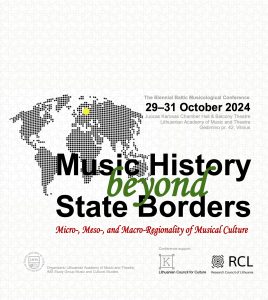2024 m. mokslo renginiai
Baltijos muzikologų konferencija „MUZIKOS ISTORIJA PERŽENGIA VALSTYBIŲ SIENAS: MUZIKOS KULTŪRA IR MIKRO-, MEZO-, MAKROREGIONAI“
2024 m. spalio 29–31 d.
Lietuvos muzikos ir teatro akademija / Juozo Karoso salė ir Balkono teatras (Gedimino pr. 42, Vilnius)
2024 m. spalio 29–31 d. Vilniuje organizuojama Baltijos muzikologų konferencija „Muzikos istorija peržengia valstybių sienas: muzikos kultūra ir mikro-, mezo-, makroregionai“. Kartu su Tarptautinės muzikologų draugijos (IMS) studijų grupe „Muzika ir kultūros studijos“ (vadovė dr. Tatjana Markovic, Vienos universitetas) rengiama konferencija siekia įdėmiai išžvalgyti ir interpretuoti muzikos reiškinių įvietinimą ir įtinklinimą, muzikos žanrų ir praktikų kultūrinius arealus nuo mažųjų tėvynių (mikroregionai) iki pasaulio kontekstų.
Baltijos muzikologų konferencijos – svarbiausias muzikologijos forumas Lietuvoje, šiemet subūręs Europos, JAV, Azijos šalių mokslininkus aptarti kultūrų ir regionų ryšius ir atskirtis, identifikacijas ir atoveiksmius. Dalyvaus kviestiniai lektoriai – ryškios konferencijai svarbios tematikos tyrimų figūros: istorikas profesorius dr. Jörg Hackmann (Ščecino universitetas, AABS/Association for the Advancement of Baltic Studies), muzikologės dr. Rasika Ajotikar (Hildesheimo universitetas) ir prof. dr. Tatjana Marković (Austrijos Mokslų akademija). Konferencijos metu rengiamos specialios sesijos ir diskusija, skirta skaitmeninei humanitarikai ir jos metodologijų sklaidai muzikos redagavimo praktikose.
Organizatoriai:
Lietuvos muzikos ir teatro akademijos Mokslo centras
Lietuvos kompozitorių sąjunga
Partneriai:
Tarptautinės muzikologų draugijos (IMS) studijų grupė „Muzika ir kultūros studijos“
LMTA mokslo tyrimų projektas „Kritinis Čiurlionio fortepijoninės muzikos tekstas ir interaktyvi duomenų bazė“ (vadovas doc. dr. Darius Kučinskas)
Konferencijos programa išsamiau:
Mokslo centro informacija
2024 10 23
PROF. DR. PAULO DE ASSIS (ORPHEUS INSTITUTAS, BELGIJA) PASKAITŲ IR SEMINARŲ CIKLAS
2024 m. spalio 9–11 d. LMTA viešės prof. dr. Paulo de Assis (Orpheus institutas, Belgija), surengsiantis viešą paskaitą ir seminarą meno ir menotyros doktorantams, studentams, LMTA bendruomenei ir alumnams.
Kviečiami dalyvauti visi, studijuojantys, besidomintys aktualiais meniniais tyrimais. Paskaita ir seminaras vyks anglų kalba.
Prof. dr. Paulo de Assis
Profesorius dr. Paulo de Assis (Orpheus institutas, Gentas, Belgija) yra pirmaujantis tyrėjas, derinantis muzikinę praktiką (kaip klasikinio repertuaro pianistas, eksperimentuojantis atlikėjas ir režisierius), muzikologinę XX a. Vakarų meno muzikos ekspertizę, leidybinę patirtį (kaip autorius ir redaktorius) ir plačius tarpdisciplininius interesus šiuolaikinės filosofijos ir epistemologijos srityje. Pastaruosius dvylika metų jis dirba meno tyrimų srityje: buvo ERC dotacijos pagrindinis tyrėjas (2013–2018), yra tarptautinės konferencijų serijos „Deleuze and Artistic Research“ įkūrėjas ir pirmininkas, „Rowman & Littlefield International“ (Londonas/Niujorkas) knygų serijos „Artistic Research“ redaktorius. Trijų monografijų ir 14 rinktinių autorius savo darbuose ir renginių cikluose plėtoja inovatyvius konceptus ir prieigas, kurios turi milžinišką poveikį tarptautinei meninių tyrimų plėtrai ir prestižui. Prof. dr. Paulo de Assis dėsto ir konsultuoja jaunuosius tyrėjus daugelyje Europos šalių ir JAV, yra Europos mokslo fondo, Šveicarijos nacionalinės mokslo tarybos, Flandrijos mokslo fondo ir kt. mokslo tyrimų politikos ir rėmimo institucijų ekspertas.
***
Spalio 9 d. (trečiadienis), 15 val. (LMTA Centriniai rūmai, Balkono teatras)
Paskaita Artistic Research: Forging Aesthetico-epistemic Relational Art Practices
Anotacija
Art and society are undergoing an epochal transformation. Digital tools, information-driven systems, and new technologies are inducing a major epistemic revolution, radically altering our conception of who we are, how we relate to each other, what we do, how we conceive of reality, and how we interact with the world. Primarily associated with processes of digitisation, much attention has been given to the technical and technological apparatuses that directly impacted and changed our lives in the last decades: innumerable microelectronic devices, countless software tools, growing network-systems, widely available big data, instant informational flow and widely accessible artificial intelligence. This transformation profoundly challenges institutions and discourses, leading to an unavoidable rearrangement of human practices and to a redefinition of major societal constructs. It also leads to new modes of knowledge production, forms of human interaction, perspectives on the natural world, and artistic expressions.
Western art music is also undergoing a significant historical shift. From the invention of notation by Guido of Arezzo around the year 1000 to the late twentieth-century avant-gardes that explored the limits of action- and hyper-notation, this tradition now appears increasingly historical and disconnected from contemporary challenges. Having moved beyond its initial oral phase and a subsequent epoch dominated by written/symbolic artifacts (scores), music culture now thrives in the digital realm, where ‘sound’—whether recorded or digitally produced—is central. Additionally, the integration of sound with visuals, scenic contexts, and semantic associations shifts the focus from the autonomy of the artwork to a relational (post-)aesthetics that fosters new modes of sensorial and epistemic engagement.
In this context, artistic research emerges as a highly promising vehicle for innovation in the arts and music worlds. By merging artistic practice with epistemic inquiry, artistic research creates new networks that encompass both tangible and intangible elements, material particles, and abstract diagrams. This approach engages both practitioners and audiences in the creation and reception of diverse and diffractive outputs that intertwine thought, sense, and sensation in complex ways.
In this two-day lecture and seminar, musician and artist-researcher Paulo de Assis will explore these topics from a practitioner’s perspective. The lecture and seminar will include theoretical discussions and feature concrete examples through case studies for participant discussion and interaction. Furthermore, individual coaching sessions will be an integral part of actively engaging participants.
Susitinkame 15 val. Lietuvos muzikos ir teatro akademijos Balkono teatre (LMTA Centriniai rūmai, Gedimino 42, Vilnius).
Paskaitą moderuos Edvardas Šumila, Lietuvos muzikos ir teatro akademijos dėstytojas, universiteto New School for Social Research (NYC) doktorantas.
***
Spalio 10 d. (ketvirtadienis), 10.00 val. (LMTA Centriniai rūmai, Balkono teatras)
Seminaras ir doktorantų meno projektų pristatymai (vieša diskusija)
Susitinkame 10.00 val. Lietuvos muzikos ir teatro akademijos Balkono teatre (LMTA Centriniai rūmai, Gedimino 42, Vilnius).
Doktorantų diskusiją moderuos Julija Bagdonavičiūtė ir Matas Samulionis.
***
Spalio 10-11 d. Kongresų rūmų 215 aud. (LMTA Kongresų rūmai, Vilniaus g. 6)
Profesoriaus dr. Paulo de Assis individualios konsultacijos
Susitikimai individualioms konsultacijoms:
- spalio 10 d. nuo 15 iki 18 val.
- spalio 11 d. nuo 945 iki 12 val.
Registracijos į individualias konsultacijas nuoroda: https://shorturl.at/m8N4x
———————————————————————————————————————-
Daugiau informacijos:
LMTA mokslo centras
Prof. dr. Rūta Stanevičiūtė-Kelmickienė
El. paštas ruta.staneviciute@lmta.lt
Tel. +370 604 07707
Dr. Božena Čiurlionienė
El. paštas: doktorantura@lmta.lt, bozena.ciurlioniene@lmta.lt
